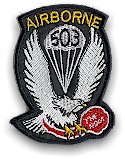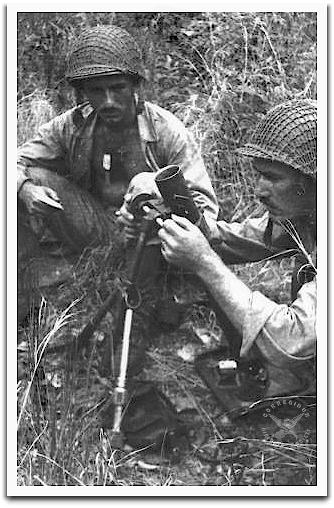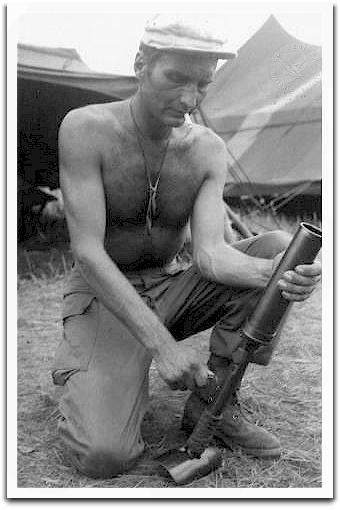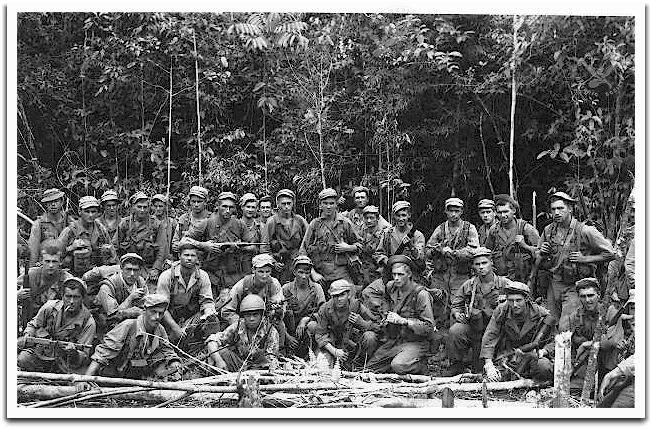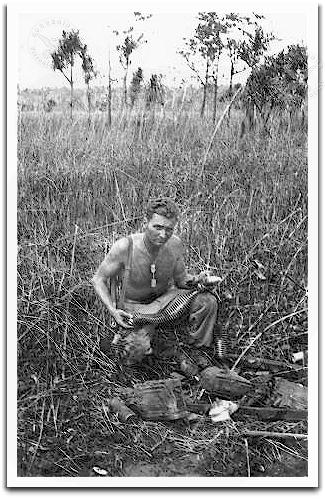|
Noemfoor was not a large island, perhaps 14 or 15 miles across, all of it
rough terrain, forested with almost impenetrable jungle, and heavily
populated by poisonous snakes, stinging vines, land crabs, aggressive
mosquitos, and other unpleasant inhabitants. Not to mention the heat. Even
when it didn't rain, which was not often, our dark green coveralls were
almost always soaking wet from sweat. We never wore our fancy polyurethane
jump suits. They were totally unfit for this climate.
I think the value of the island lay in its possible future use as a base for
aircraft which would attack Japan. The enemy themselves had used it for
planes and there still were aviation fuel dumps near the former airfield.
Indeed, we found some of that gasoline pretty handy for heating coffee and
field rations.
For a few days my platoon had no serious duties. They had some time to rest.
Once, when I had been off on some mission or other I came back to our area
to find that my guys had dug a slit trench for me. A slit trench was about
the safest place to sleep. Just the same, I always kept my machete and
trench knife handy, just in case some overbold Jap crept up in the night.
To prevent that very thing we established a ring of sentinels around the
camp, two men to a foxhole, there to warn and help stop any incursion. My
platoon got the job one night. By this time we had received several
replacements, men who were new to us and new to combat. When I lined up my
platoon prior to taking our positions, I went down the ranks, checking each
soldier for readiness and equipment. I stopped before one of these new
replacements and looked him over. He was armed with a pistol, which he held
pointed upward, the proper position for inspection. When I moved to the next
man he pointed the pistol down and pulled the trigger. The damn thing was
loaded, with a round in the chamber. All hell broke loose, heads popping out
of tents all over the area. "Stand fast!" I yelled at my own men and they
did. Luckily, no one was hurt. I told the boy — and that was what he was --
to step out of the formation. I never saw him again; perhaps he was assigned
to kitchen duty. Perhaps he was a fine young man, but I could not afford to
take chances with his inexperience.
This was just a minor interruption in the daily patrols into the jungle
carried on by our rifle units. Somewhat to my surprise, my platoon was
picked for one of these and it was led by our company executive officer. We
left our mortars behind and hiked off into the forest armed with our rifles
and grenades. Behind the scouts we had out front came the exec and the
platoon. I brought up the rear. We had been hiking down a trail for an hour
or two when I heard firing break out at the front and rushed forward to see
what was happening. We had run smack into a unit of Japanese soldiers coming
toward us on the same trail. It was what the military manuals call a
"meeting engagement," in short, an accidental encounter. Our lead scout,
armed with a tommy gun, had performed beautifully, killing some of the
enemy. Unhappily, we lost some of our best men in the first seconds,
including a former platoon sergeant and a corporal. A second sergeant was
badly wounded.
The exec ordered me to take a squad around the left flank, which I did,
laying down a fire line when we reached our position. We were at a junction
of three trails and the enemy had taken cover in the woods behind one which
ran across our front. Firing continued. I could hear Japanese voices, but
could see nothing. I stood for a better look and belatedly realized the
little twigs and branches falling around my head were caused by bullets.
Eventually the firing died away and we departed, stopping only long enough
to bury our two dead and make a stretcher for the wounded sergeant.
Two or three days later my company commander told me to go back to the scene
of the firefight, bring back the bodies of the two men we had buried, and
turn them over to graves registration at the beach. Reluctantly, graves
registration let us have two stretchers and we set out. Exhuming those two
bodies was not fun. Despite being wrapped in ponchos they were already
crawling with maggots and the smell was awful.
The scene of our little battle was unchanged. Japanese bodies lay where they
had fallen and I was pleased to see that we had killed about 20. Even a few
weapons had been left, one of which was a light machine gun. On the way back
to the beach we ran into the colonel and some of his aides. He asked me if I
had seen any good place for a permanent camp and, not in the most diplomatic
of moods, I told him the best place would be near the beach, where the men
could at least go for a swim. I also offered the opinion that a truck would
be a big help in getting my dead men back to the beach. And surprise,
surprise, he radioed for a truck to meet us where the track became a road.
And we turned over the bodies to graves registration.
Those were good men. One, the former platoon sergeant, was an intelligent
but independent minded young man. Whenever I asked him how things were going
he would answer, "Mediocre, lieutenant, mediocre." And when I came to him as
he lay dying just off the |

